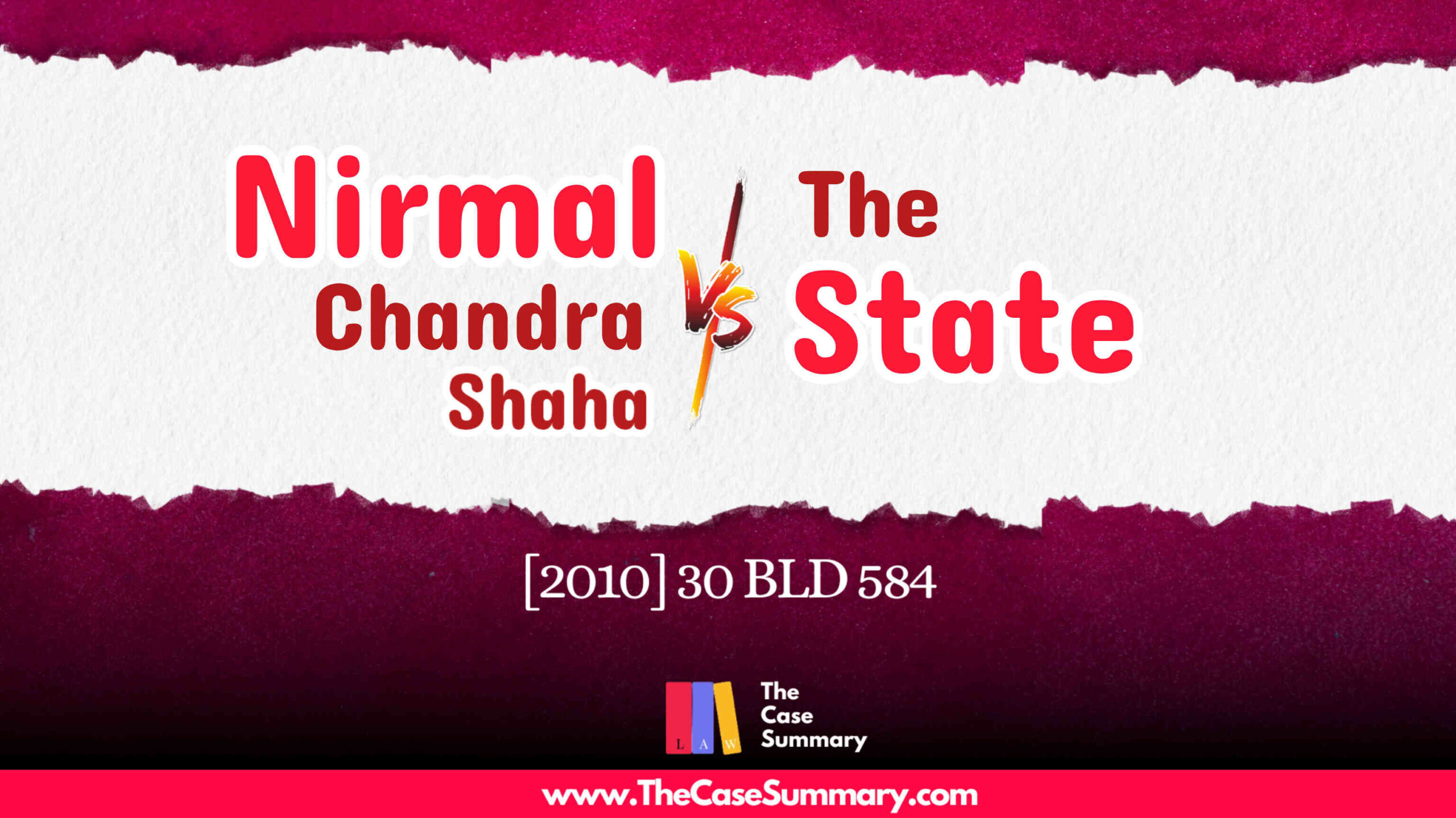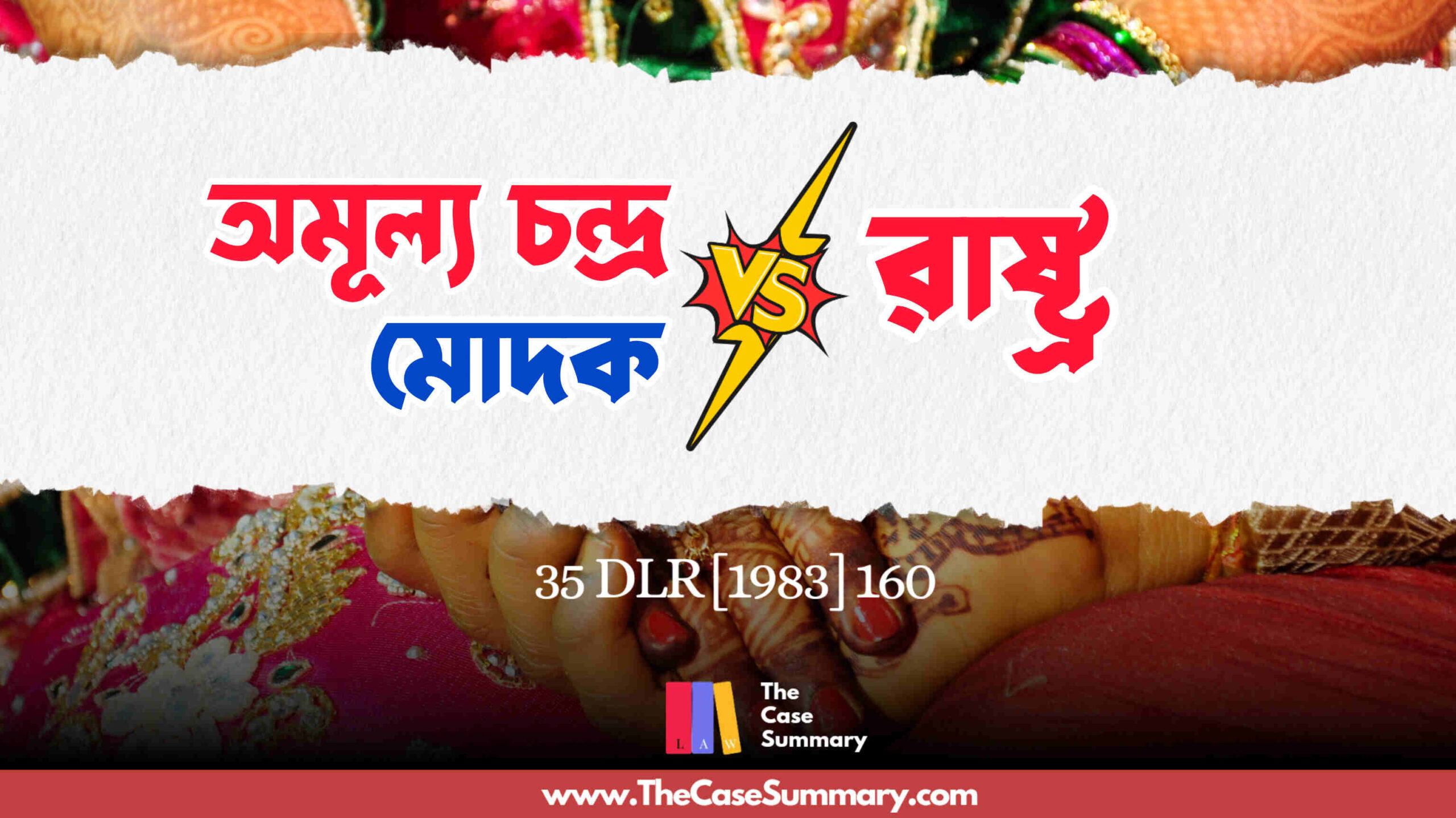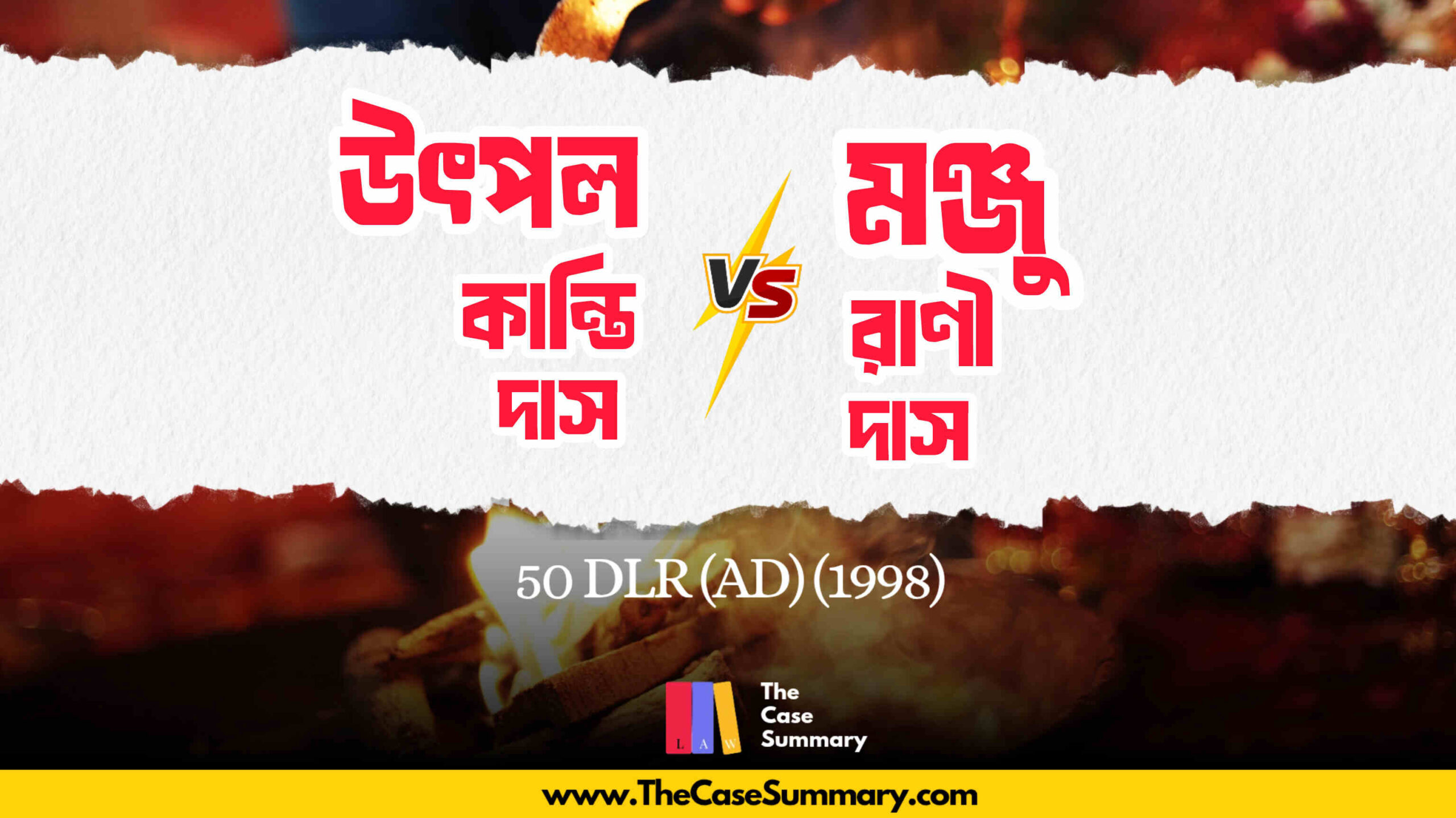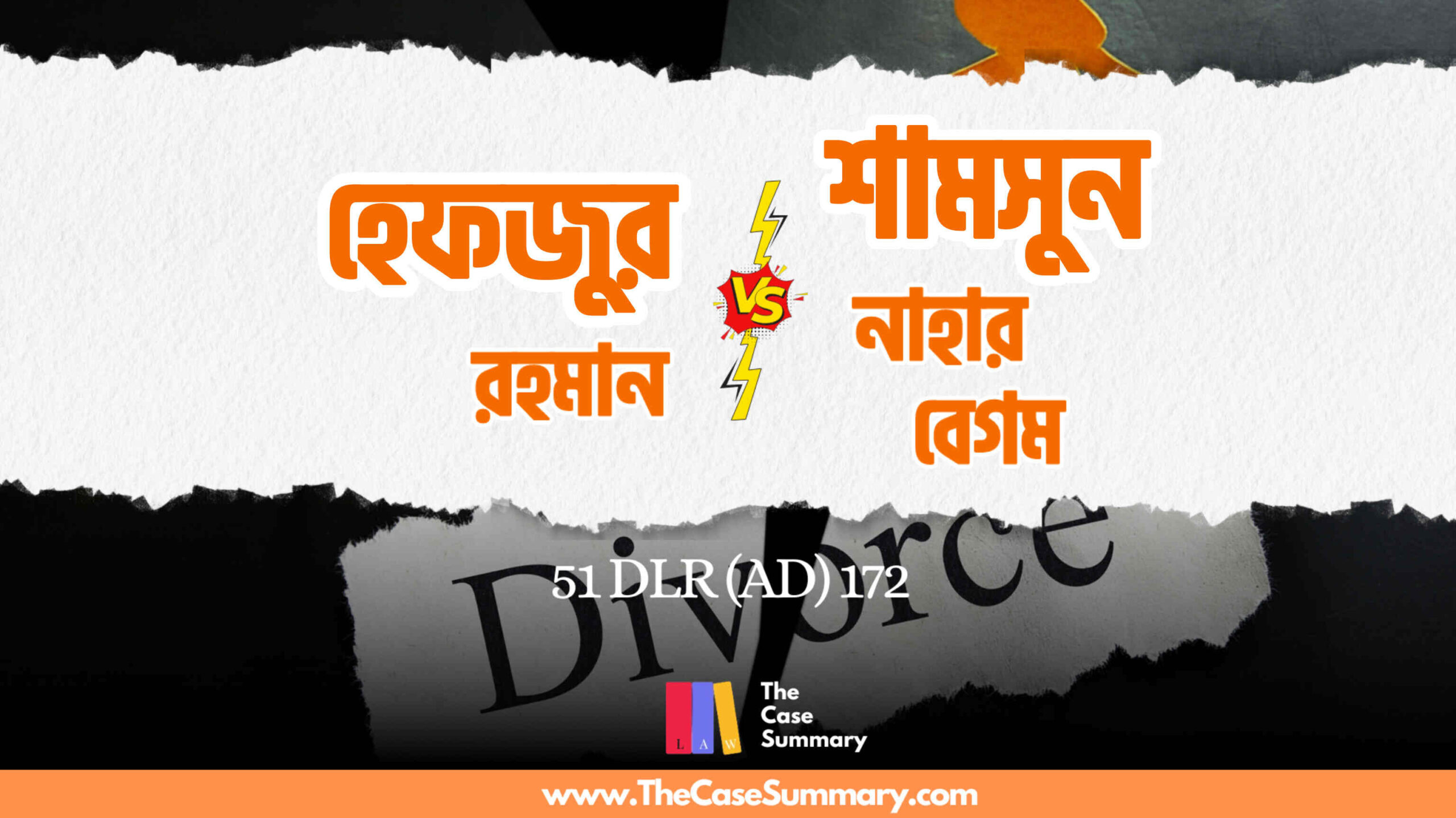Nirmal Chandra Shaha vs The State and Others
Reference : [2010] 30 BLD 584
Jurisdiction : Bangladesh
Appellant : Nirmal Chandra Shaha
Respondent : Government of the People’s Republic of Bangladesh and others
Facts :
The appellant, Nirmal Chandra Shaha, filed an FIR alleging that accused Prabir Deb Nath, Sanjoy Mazumder, Bishwanath Deb Nath and Manik Lal Deb Nath had kidnapped his daughter Kanamika also known as Kona Shaha. She was at that time a candidate for S.S.C. examination. After investigation, Police submitted a charge sheet against the primary accused Prabir Deb Nath under Section 7 of Nari-o-Shishu Nirjatan Daman Ain, 2000.
The Victim, Kanamika, was initially ordered to be kept in safe custody and held in Lakshmipur District Jail. During the time, Kanamika’s age was assessed based on radiological X-ray plates, which indicated she was 15 years old. However, she gave a statement to the learned Magistrate under Section 22 of the Nari-o-Shishu Nirjatan Daman Ain, 2000, claiming that she was 19 years old and that she had willingly left home on March 15, 2009, with the man of her choice. She stated that they married on March 17, 2009, and further expressed her wish to stay with her husband or mother-in-law.
Based on her statement, the Sessions Judge in Lakshmipur rejected her father’s custody application on May 4, 2009. On July 16, 2009, the Nari-o-Shishu Nirjatan Daman Tribunal ordered her transfer to Nirapadh Abasan Kendra in Hathazari, Chittagong. Nirmal Chandra Shaha subsequently appealed to the High Court Division to seek custody, arguing that Kanamika was a minor under the Majority Act, 1875 and should remain under his guardianship.
Issues :
1. Should the custody of Kanamika be granted to her father, given her minor status under the Majority Act and Guardianship and Wards Act?
2. Should Kanamika’s expressed wishes to stay with her husband or mother-in-law, as per her statement impact the custody decision?
3. Should under Hindu law, custody be granted to her husband or his family, considering her marital status and her husband’s current imprisonment?
Arguments :
Mr. Humayun Hossain Khan, counsel for the appellant, argued that according to Kanamika’s school records and S.S.C. admit card, she was born on April 1, 1993, making her under 17 and thus a minor under the Majority Act, 1875. He further cited The Guardians and Wards Act, 1890, asserting that her father, as her rightful guardian, should have custody. The appellant’s counsel maintained that the victim’s wishes were irrelevant in determining custody, as per Appellate Division precedents, referencing cases such as Abdul Majid Sarker (Md) vs. State and Sree Mongol Chandra Nandi vs. Bangladesh, which uphold the father’s role as the best well-wisher. Additionally, he contended that Article 12 of the Convention on the Rights of the Child (CRC) could not be applied here, as the CRC, despite signed by Bangladesh, is not part of domestic law and conflicts with local legislation.
Ms. Syeda Anowara Sattar, counsel for the respondents, argued that under Hindu law, a minor wife’s custody legally passes to her husband upon marriage. She noted that, per the Children Act, 1974, which defines a minor as someone under 16, Kanamika was not a minor based on her school records. She contended that, as a signatory to the CRC, Article 12(1) should be applied in this case, prioritizing Kanamika’s expressed desire to live with her husband and mother-in-law. She further cited Section 6(c) of the Hindu Minority and Guardianship Act, 1956 (an Indian statute), which supports the husband’s guardianship rights over his minor wife.
Decisions :
The Court allowed the appeal and considered their marriage valid.
After considering both submissions, the High Court Division decided to speak directly with the victim, Kanamika Shaha. She informed the Court that she had an unmarried elder sister who had previously assaulted her both physically and verbally. This treatment had initially made her unwilling to return to her parents’ home. However, she assured the Court that she would be willing to go back if her elder sister refrained from further abuse.
Upon reviewing her statement, the Court reaffirmed that the custodial rights of a Hindu married woman reside with her husband, despite her being a minor. In Kanamika’s case, her custody would have ordinarily been granted to her husband as she was a married woman. However, her husband’s incarceration nullified this entitlement.
Given the documented history of physical and verbal abuse faced by Kanamika at her parents’ home, the Court determined that enforcing parental custody would be contrary to her welfare. To ensure her physical safety and continued education, the Court assigned the Bangladesh National Women Lawyers’ Association (BNWLA) to monitor her well-being and submit a report within six months. Under these conditions, the Court permitted Kanamika to return to her family.
Relevant Laws :
- Nari-o-Shishu Nirjatan Daman Ain, 2000
- Section : 7, 22
- The Majority Act, 1875
- The Guardians and Wards Act, 1890
- The Convention of the Right of the Child (CRC)
- Article : 12
- The Children Act, 1975 (Repealed)
- Section : 2 (f)
- Hindu Minority and Guardianship Act, 1956
- Section : 6 (c)
Author :
1. Nusiba Hasan Ohee
Note : The Case Summary is a platform by the law students, for the law students. We aim to summarize the facts and decisions of various important cases in both Bangla and English with utmost caution. However, this platform is in no way a replacement for going through the complete judgements by the law students and we discourage any learner from relying on case summaries alone. Thank you



